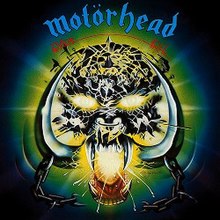Overkill (Motörhead album)
| Overkill | ||||
|---|---|---|---|---|
 |
||||
| Studio album by Motörhead | ||||
| Released | 24 March 1979 | |||
| Recorded | December 1978–January 1979 | |||
| Studio | Roundhouse Studios and Sound Development Studios, London | |||
| Genre | Heavy metal, speed metal, hard rock | |||
| Length | 35:15 (Original) 50:56 (Reissue) |
|||
| Label |
Bronze (UK) (1979) Castle Communications (1996) Sanctuary (2005) |
|||
| Producer | Jimmy Miller, Neil Richmond | |||
| Motörhead chronology | ||||
|
||||
| Singles from Overkill | ||||
| Singles from Overkill (1996 reissue) | ||||
|
||||
| Professional ratings | |
|---|---|
| Review scores | |
| Source | Rating |
| Allmusic |
|
| Blender |
|
Overkill is the second studio album by the band Motörhead, released 24 March 1979, on Bronze Records, their first with the label, and it peaked at #24 on the UK charts. Kerrang! magazine listed the album at #46 among the "100 Greatest Heavy Metal Albums of All Time".
Bronze Records signed Motörhead in 1978 and gave them time in Wessex Studios in London to record Richard Berry's "Louie Louie" and a new song by the band, "Tear Ya Down." The band toured to promote the single "Louie Louie," which became a modest hit, while Chiswick released the Motörhead album in white vinyl, to keep the momentum going. In the Classic Albums documentary on the making of Ace of Spades, Gerry Bron of Bronze Records admits:
"..The first time I heard Motörhead was when I listened to a single that I put out without hearing, which is "Louie Louie," and when I heard it I was absolutely horrified. I thought it was the worst record I've ever heard, so it was a bit of a shock. The bigger shock was, having put out a record I thought was terrible, it went straight into the charts at #72. But I actually put the record out as a favour.."
Sales of the single brought the band their first appearance on BBC Television's Top of the Pops, which gave Bronze the confidence to get the band back into the studio to record a second album. In the 2011 book Overkill: The Untold Story of Motörhead, biographer Joel McIver quotes guitarist "Fast" Eddie Clarke:
"..We had so many false starts and disappointments by the time Overkill came around in 1978 we had stored up a lot of energy and ideas – and we were just waiting for the opportunity to show what we could do. Also we had a great following, and we always felt we owed the fans who had been with us from the beginning.."
Speaking to James McNair of Mojo in 2011, vocalist and bassist Lemmy concurred:
"..by the time of Overkill we were getting our sound together.."
...
Wikipedia
